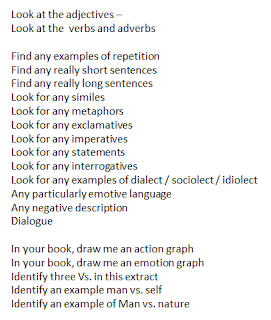A fair few of you have been to see me, so here is some last minute advice and reassurance. First of all, don't worry too much about this! We obviously want you to do well, but if you get anything wrong, it's not the end of the world, and we'll make sure that you know how to avoid making the same mistake in the future - what with it being our jobs and all. So, take a deep breath, make sure you follow the guidelines, and you'll be fine.
1. Plan. Spend the first ten mins collecting your ideas, answering the question in your head, going over the extract, using the toolkit (that I've pictured here), picking out quotes and linking ideas together. You might see kids who have written a side in the first ten minutes; that doesn't matter. Plan. Do all your thinking now, so that you'll avoid all that thinking whilst writing I want you to avoid. Plan it over one side, maybe two, but make sure you put a single line through it to show that it is a plan.
2. For the second half of the TKAM question, choose
your extract carefully - make sure it answers the question you have been asked! Once you've picked your extract (make sure it isn't too long or short), simply analyse it in the same way that you analysed the first.
3. At the end of every paragraph, just check that it answers the question you have been asked. If you've planned properly this shouldn't be an issue, but it won't hurt to check.
4. Check out the model answers. We'll do more of these later on, but you kids are throwing your sizeable intellect at this question like it is a Literature exam, and it's not. Check out the models I've given you or provided you with online, and make sure your answer looks like an exemplar language response, not the model Literature responses you all gave me in the baseline assessment.
5. Don't forget the basics on the written section. You're all really, really able pupils, so make sure that you don't include any mistakes that suggest you aren't. Apostrophes and capital letters are standard, so make
sure you use them. Any problems with the apostrophes, then
check this out.
Questions? Comments? Bell & Ross watches? All welcome - send them in to the usual address.




